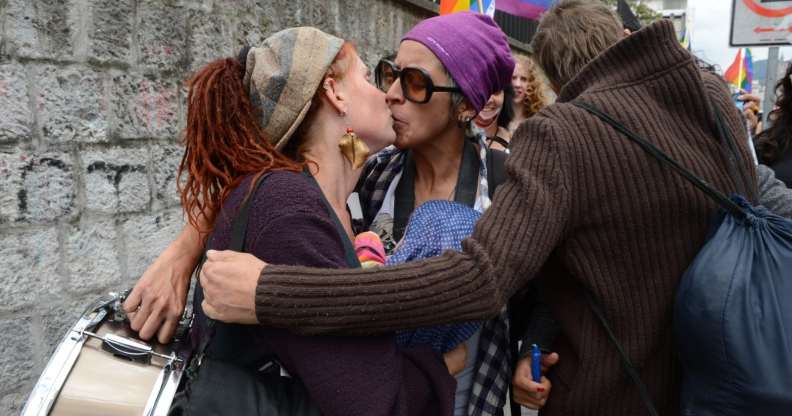Gay family recognised by state in Ecuador in historic decision

)Image: RODRIGO BUENDIA/AFP/GettyImages)
A seven-year-old girl will be registered with both surnames of her two mothers in Ecuador, in a move hailed by campaigners as step forward for the recognition of LGBT families in the country.
The Constitutional Court ordered the Civil Registry office to register Satya Amani Bicknell Rothon, the daughter of couple Helen Bicknell and Nicola Rothon.
The case had been ongoing since September 2012.
At a press conference after the decision, Bicknell said: “We knew we were going to win but we did not know when.

People take part in the Gay Pride Parade in Quito (RODRIGO BUENDIA/AFP/Getty)
“This is the result of a collective effort,” she added.
One of the lawyer’s involved in the case, Jose Luis Guerra, said failing to register the child’s name was in violation of her rights, TeleSUR English reported.
Guerra added the move was significant in recognising the diversity of families in Ecuador.
Ecuador’s Constitutional Tribunal repealed the law that criminalised same-sex sexual relations between consenting adults in 1997.
In 2015, Ecuador passed an amendment to its Civil Code which legalised same-sex civil unions.
Yolanda Herrera, an Ecuadorian lawyer with a focus on LGBT rights, told TeleSUR English that there are still issues around adoption and surrogacy despite the recognition of civil unions.

An LGBT activist protests against discrimination in Ecuador with “public kiss”
demonstration (AFP/Getty)
“There are legal loopholes that are up in the air, like the affiliation of the child of a same-sex couple that decides to have children,” she said.
“Today, those two mothers cannot [both] be registered, or in the case of surrogate mothers for two fathers, they cannot register their children. Only the person that gives birth [will be registered].”
The country passed a law in 2016 allowing people to choose their preferred gender on their ID cards.
Discrimination against the LGBT+ community remains an issue in Ecuador, however, with activists recently calling for an end to gay conversion therapy in the country.
Ecuador banned the practice, according to the International Lesbian, Gay, Bisexual, Trans and Intersex Association (ILGA), but activists say gay Ecuadorians are still subjected to it.
Conversion therapy has been widely discredited by health experts for risking causing emotional and psychological damage.
Cayetana Salao, of Taller de Comunicacion Mujer, a lesbian, gay, bisexual and transgender (LGBT) rights group, told Reuters: “Corrective therapy, in mostly private and clandestine alcohol and drug addiction clinics, continues in Ecuador. It’s a reality.”
Conversion therapy continues to be legal in the UK, despite evidence that thousands of people are forced to endure the practice.

